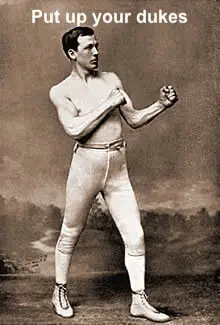Put up your fists and prepare to fight.
Put up your dukes
What's the meaning of the phrase 'Put up your dukes'?
What's the origin of the phrase 'Put up your dukes'?
The ‘dukes’ are the hands or fists. There doesn’t appear to be any obvious connection between ‘dukes’ and ‘fists’ so, before we get to ‘put up your dukes’, we need an explanation of how the two words came to be linked.
The use of ‘dukes’ meaning ‘hands’ is first referred to in print in the mid 19th century, in both England and the USA. The American soldier Samuel E. Chamberlain used it in his memoir My Confession, Recollections of a Rogue, circa 1859:
I landed a stinger on his “potatoe trap” with my left “duke,” drawing the “Claret” and “sending him to grass.”
Put up your dukes is
Cockney rhyming slang,
which links ‘dukes’ with
‘hands’
The most commonly repeated suggestion as to how ‘dukes’ came to mean ‘fists’ is that it derives from the Cockney rhyming slang – Duke of Yorks -> forks -> fingers/hands.
At first sight this seems rather unlikely as the link between forks and fingers is hardly intuitive. There is a clear connection though – ‘forks’ had been a slang term for ‘fingers/hands’ since the 18th century. It is recorded as slang for ‘pickpocket’ in Nathan Bailey’s, Etymological English Dictionary, 1737:
“FORK, a Pick-pocket. Lets Fork him; Let us pick that Man’s Pocket. It is done by thrusting the Fingers, strait, stiff, open and very quick into the Pocket, and so closing them, hook what can be held between them.”
The term ‘fork-out’, meaning ‘pay money’, comes from the same source and is recorded by 1831.
The earliest citation that I can find in print of the expression ‘put up your dukes’ is in John C. Hotten’s A Dictionary of Modern Slang, Cant and Vulgar Words, 1874, and this also supports the ‘forks’ = ‘fingers’ notion:
“Dooks, or dukes, the hands, originally modification of the rhyming slang ‘Duke of Yorks,’ forks = fingers, hands… The word is in very common use among low folk. ‘Put up your dooks’ is a kind of invitation to fight.”
Alternatively, it is sometimes suggested that ‘put up your dukes’ derives as a reference to the Marquis of Queensbury, who created the well-known ‘Queensbury Rules’ for the regulation of boxing bouts. That’s an appealing idea but, again, there’s no real evidence to support it and, as is obvious, Queensbury was a marquis, not a duke.
Most Americans won’t realise that the expression ‘duke it out’, which is the US variant of ‘put up your dukes’, is in all probability an homage to the favourite son of the ruler who did all that he could to prevent the formation of the United States. The ruler was of course the English King George III and the favoured son was Prince Frederick, Duke of York and Albany.
[As an aside, if anyone has evidence to support the rumour that the 1994 film ‘The Madness of King George’ was given that name in the USA because ‘The Madness of George III’, which was the title of the original play, might have made the Yanks think it was a sequel to ‘The Madness of George I’ and ‘The Madness of George II’, I would love to see it. Methinks that’s probably an urban legend.]
George III was by no means mad, but he did overestimate the abilities of the young prince. Despite having no particular military skills, Frederick was made a field-marshal and given control of the British Army. His lack of expertise was lampooned in the nursery rhyme ‘The Grand Old Duke of York’, which refers to his misuse of ten thousand troops in an engagement near Flanders, in which he ‘marched them up to the top of the hill and marched them down again’. Despite Frederick’s lack of aptitude, he did later institute several useful military reforms. It is generally accepted that when someone squares up for a fight and ‘puts up his dukes’ he is the duke that is being alluded to.
Although the term ‘duke’ had been common in the USA since at least 1859, ‘duke it out’ didn’t occur until the 1960s. An early use was by Garry Niver, in the The San Mateo Times, May 1964:
“As expected, the Mid-Peninsula League baseball chase is going right down to the wire. However, instead of two teams figuring to duke it out for the coveted crown, there will be three.”
The history of “Put up your dukes” in printed materials
Trend of put up your dukes in printed material over time
Related phrases and meanings
Browse more Phrases
About the Author

Phrases & Meanings
A-Z
A B C D E F G H I J K L M N O P Q R S T UV W XYZ
Categories
American Animals Australian Bible Body Colour Conflict Death Devil Dogs Emotions Euphemism Family Fashion Food French Horses ‘Jack’ Luck Money Military Music Names Nature Nautical Numbers Politics Religion Shakespeare Stupidity Entertainment Weather Women Work
How did we do?
Have you spotted something that needs updated on this page? We review all feedback we receive to ensure that we provide the most accurate and up to date information on phrases.
